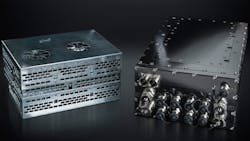Intel Angling for Piece of Self-Driving Market with New Processors
Intel Corp., trying to convert its dominance of computers into a stake in the growing market for chips used in cars, is offering automakers new products aimed at making its technology crucial to the effort to develop self-driving vehicles.
‘Intel Go’ will feature processors ranging from its smallest Atom chips all the way up to its most powerful Xeon product packaged with other components and software. It will be available in the first half of 2017, the company said Wednesday.
The world’s largest chipmaker is seeking to gain a greater piece of what the industry is targeting as its next big market. As cars make the move from primarily mechanical devices to become increasingly dependent on electronics, Intel, Nvidia Corp. and Qualcomm Inc. are tuning their digital products to provide more intelligence in vehicles.
Intel processors are a good fit for autos because the same type of chips are used to develop software on personal computers and process information in data centers, said Doug Davis, the head of Intel’s car unit. The company also announced Wednesday that it will offer the first version of a new modem to connect to forthcoming 5G cellular networks. That part will be available to test in the second half of 2017.
Intel’s chips are already designed into 30 vehicle models that are on the road and are being used in hundreds of autonomous test vehicles, the company said. It doesn’t break out how much revenue is generated by that market. Nvidia automotive chip sales rose to $320 million in its 2016 fiscal year from $183 million in the preceding period.
Neither Intel nor Nvidia made it into the the Top 10 chip providers to the automotive market in 2015, according to IDC Corp. One chipmaker that did, NXP Semiconductor NV, last year bought another on the list, Freescale Semiconductor. Now that combined company is being acquired by Qualcomm.
About the Author
Bloomberg
Licensed content from Bloomberg, copyright 2016.
